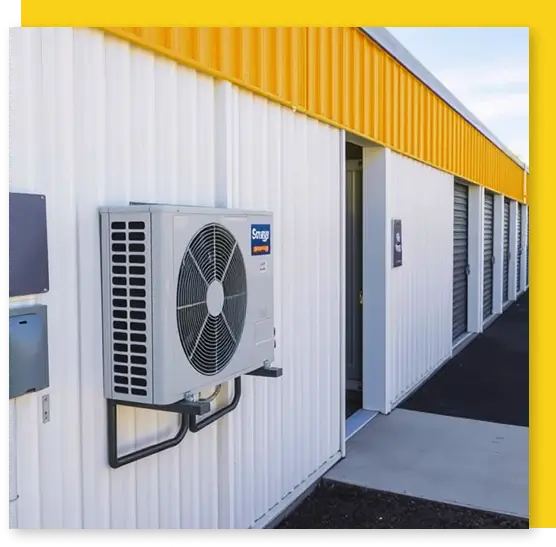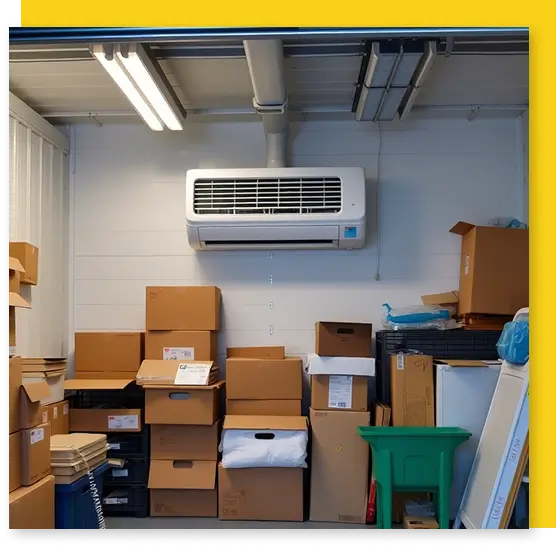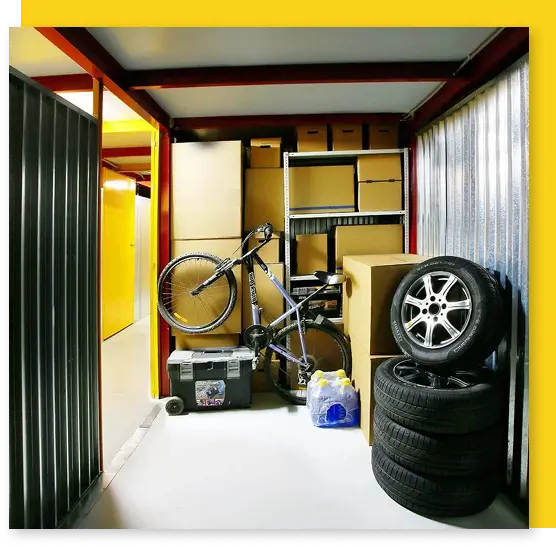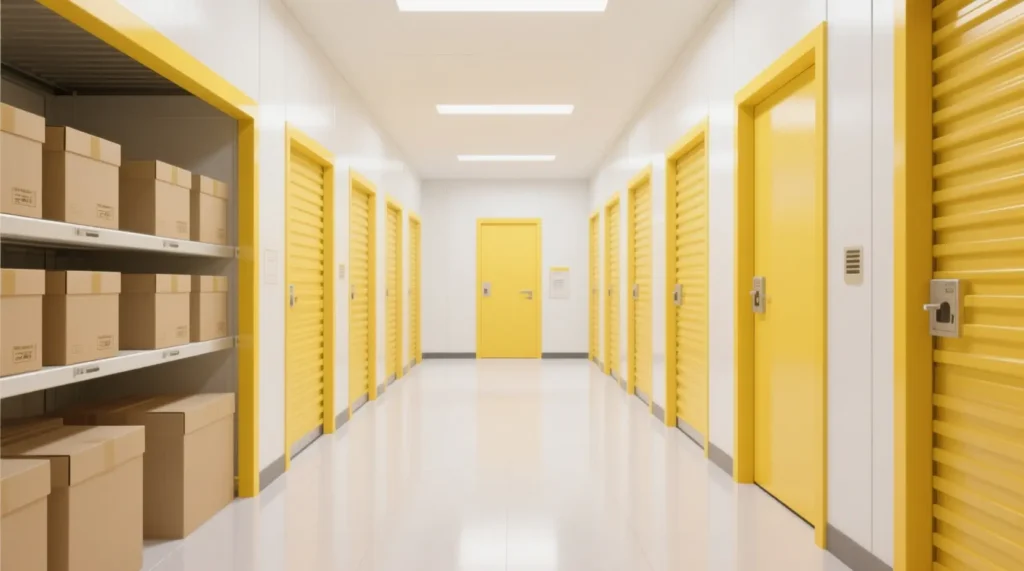Abu Dhabi’s population passed ~4.14 million in 2024 (up ~7.5% YoY), which naturally increases churn in housing, relocations, and small-business activity. These are the key drivers of storage demand. Rents remain a deciding factor: area snapshots show 1-bed homes in popular districts (e.g., Al Reem Island) around AED 68k/yr and 2-beds ~AED 97k/yr; broader averages across the city can run lower (e.g., 1-bed ~AED 44k, 2-bed ~AED 69k), but either way many residents trade space for location—then lean on long-term storage in Abu Dhabi to bridge the gap.
Climate is the other pressure. Summers routinely feel muggy on ~80–90% of days, and official stats show max relative humidity averages ~78%; conditions that can warp wood, corrode electronics, and mildew fabrics without controlled storage.
This reality explains why long-term storage in Abu Dhabi has become more than a convenience; it’s a necessity. But choosing the right facility isn’t simple. It requires understanding security, climate risks, pricing models, and how trustworthy providers address residents’ needs.

What Makes a Storage Facility Reliable in Abu Dhabi
Security and Access: The First Filter for Abu Dhabi Residents
Security is the foundation of long-term storage. In Abu Dhabi, reliable facilities usually follow SIRA (Security Industry Regulatory Agency) standards for CCTV monitoring. Look for:
- 24/7 surveillance cameras with night vision
- Controlled access gates and secure keycard or PIN entry
- On-site staff presence and alarm systems
- Vehicle tracking for delivery and pickup
Ask the provider about video retention policies and whether footage is monitored live or only stored. A truly dependable storage company should have clear answers and documented compliance.
Tip for residents: Always ask for documented proof of SIRA compliance. Reliable facilities will share it upfront.
Climate Control and Cleanliness: Protecting Belongings from Harsh Conditions
Abu Dhabi residents know how harsh summers can be. Temperatures soar to 48°C, while humidity often reaches 70–80% in coastal areas. A trustworthy storage facility in Abu Dhabi should offer:
- Climate-controlled units (18–25°C with 40–60% relative humidity)
- Regular pest control and cleaning schedules
- Dust-free interiors with sealed flooring and ventilation
For long-term storage in Abu Dhabi, climate-controlled units are non-negotiable. Residents should specifically confirm temperature and humidity ranges in writing.

Transparent Pricing: Avoid Hidden Surprises
Hidden fees are a red flag. Reputable storage providers explain costs clearly:
- Monthly or annual rental rates by unit size (e.g., 25 sq ft, 50 sq ft, 100 sq ft)
- VAT inclusion (standard 5% in the UAE)
- Security deposit and refund policies
- Additional charges for insurance, late payments, or access beyond normal hours
Storage costs in Abu Dhabi vary, but clarity is key.
Unit Size | Average Monthly Cost (AED) | Best For |
|---|---|---|
| Locker (10–15 sq ft) | 300–400 | Documents, seasonal clothes |
25–35 sq ft | 500–700 | Studio contents, small furniture |
| 50 sq ft | 1,000–1,400 | 1–2 bedroom apartment |
100+ sq ft | 2,000+ | Large villas, business stock |
With ADNEC hosting major expos, storage is vital for staging equipment, décor, and AV systems.
What event storage in Abu Dhabi enables: Faster turnarounds, organized sets between shows, and less damage in transit. Facilities near Mussafah and the airport corridors are popular due to road links and loading bays.
What to store: Modular stands, signage, truss, lighting, cables, and spare AV. Ask for late-night access, vehicle-height clearance, and pallet space.
Case: An event company booked a 100 sq ft unit near Mussafah for expo materials, benefiting from extended access hours and drive-up loading.
Seasonal Residents (“Snowbirds”)
Families from GCC countries often stay for part of the year. Storage lets them rent their property while their belongings remain protected.
Why long-term storage in Abu Dhabi suits seasonal living: You can lock up personal effects, rent your apartment while you travel, and have everything redelivered before your return.
Good features: Climate-controlled storage units in Abu Dhabi, pickup & return (“box storage”) for lighter items, and flexible billing so you only pay for the months you need.
Bonus: Key-holder services for property managers make handovers easier.
Students & Young Professionals
Affordable lockers and 25 sq ft units are in demand near Khalifa University, ADU, Al Reem, and Al Raha.
Use cases: Summer moves, internships abroad, flat-sharing transitions, and decluttering small apartments.
What to store: Textbooks, PCs, small appliances, bikes, and a few pieces of furniture.
Budget tips: Compare self-storage Abu Dhabi promotions for long-term stays, ask about student discounts, and consider box-by-box storage if you only have a few cartons.
Healthcare & Legal Sector Archiving
Records must be stored for 5+ years under UAE law. Storage with climate control and access logs ensures compliance.
Why is archive storage in Abu Dhabi popular? Facilities offer controlled environments, restricted access, audit trails, and barcode indexing to find a file fast. Many coordinate secure shredding when retention periods expire.
What to confirm: Your sector’s specific retention rules and privacy obligations; request written details on security, access logs, and fire detection.
Ideal setup: Shelving for labeled archive boxes, documented chain-of-custody, and options for scan-on-demand to minimize retrieval trips.
Outdoor & Sports Enthusiasts
Kayaks, bikes, golf clubs, and camping gear need climate protection. Apartments simply don’t have the space.
Why sports storage in Abu Dhabi helps:
Heat and humidity can corrode metals, degrade glues, and mildew fabrics. Climate-controlled storage units keep gear ready for weekend trips to Yas, Saadiyat, or desert campsites.
Smart packing: Clean and dry items, use breathable covers, and store bikes on vertical racks to save space.
Villa Renovations & High-Income Households
Saadiyat, Yas, and Al Reef villa owners store high-value furniture and electronics during renovations.
Why long-term self-storage in Abu Dhabi works here: Renovation timelines slip, dust damages finishes, and contractors need space. Off-site storage protects marble tables, custom sofas, chandeliers, and A/V equipment.
What to ask for: White-glove handling, lift access for bulky items, itemized condition notes, and insurance options for premium pieces. Many families also stage items in storage between villa sales and handovers.

Reliable vs. Unreliable Storage: At a Glance
Factor | Reliable Facility | Unreliable Facility |
|---|---|---|
Security | SIRA-compliant CCTV, Hassantuk alarms, gated access | Basic locks, unverified cameras |
Climate Control | 18–25°C, 40–60% humidity, dust & pest management | Only AC corridors, no humidity control |
| Pricing | VAT-inclusive, transparent, written quote | Promotional rates, hidden extras |
| Contracts | 30-day notice, clear insurance, and refund policy | Rigid lock-in, vague insurance |
| Accessibility | Locations near residential/business hubs, flexible hours | Remote sites, restricted hours |
Reputation | Strong reviews on Google, responsive customer service | Poor ratings, hard-to-reach staff |
Residents’ Challenges: Why Trust Is Hard to Build
For Abu Dhabi residents, finding secure and affordable long-term storage is not without obstacles:
- Hidden Costs: Many discover late that insurance, VAT, or deposits raise monthly bills.
- Limited Transparency: Some companies avoid answering questions about fire safety or pest control.
- Climate Risks: Even facilities claiming “air-conditioned storage” may not manage humidity properly.
- Accessibility Issues: Residents often find facilities too far from residential hubs.
These challenges underline why trust is the most important factor in choosing long-term storage in Abu Dhabi.
Practical Steps to Choose the Right Facility
- Define your storage needs: What items are you storing? For how long? How often will you need access?
- Shortlist providers: Select 3–5 companies that meet your basic needs and budget.
- Visit or request a virtual tour: Inspect the condition of the units, climate control, and security setup.
- Ask targeted questions: About insurance, pest control, emergency access, and maintenance schedules.
- Compare side by side: Look at pricing, contract terms, customer service, and flexibility before signing.
Red Flags Abu Dhabi Residents Shouldn’t Ignore
When it comes to renting long-term storage in Abu Dhabi, not all facilities deliver what they promise. The following red flags will help you separate reliable providers from risky ones.
The corridor feels cool, but the unit does not
If the hallway AC is fine but your room is warm or humid, the “climate-controlled storage in Abu Dhabi” promise isn’t real.
What to do: Ask for recent temperature/humidity logs for your exact unit, and bring a small hygrometer when you view.
“24/7 access” with fine-print exceptions
Some storage units in Abu Dhabi close on public holidays or cap late-night entry.
What to do: Confirm last entry times, holiday policy, and whether staff are on-site after hours.
“Free pickup” that isn’t really free
Box-storage and moving support may exclude stairs, heavy items, or long distances.
What to do: Request a written pickup scope (weight limits, floors, mileage, re-delivery fees).
Insurance that’s vague or pushed at the last minute
Under-insurance or a murky claims process is risky for long-term storage.
What to do: Ask for policy wording, what events are covered, excess amounts, and claim steps—before you sign.
Security feels superficial
Blind CCTV spots, no visitor logs, or unattended gates at night are warning signs—especially for vehicle storage in Abu Dhabi.
What to do: Ask how footage is retained, which zones are covered, and how access is recorded.
Prohibited-items list not displayed, or “everything is fine”
Professional storage in Abu Dhabi will clearly list restricted items and explain why.
What to do: Ask for the written prohibited-items policy and enforcement process.
Climate specs are just marketing words
“AC on” is not a spec. You need target ranges for temperature and relative humidity.
What to do: Ask for setpoints and acceptable ranges; confirm alarms trigger if thresholds are exceeded.
Location described loosely
“Near Khalifa City,” but actually far off, adds time and fuel to every visit.
What to do: Pin the exact map location; test the drive during your typical visiting hours.

Conclusion: Choose Protection You Can Prove
For Abu Dhabi residents, long-term storage isn’t a nice-to-have—it’s the practical way to protect value when homes are compact, moves are frequent, and summers are unforgiving. A reliable storage facility in Abu Dhabi will show its quality, not just claim it: documented security, unit-level climate control, VAT-inclusive pricing, clear contracts and insurance, and access that fits your routine. Compare long-term storage solutions in Abu Dhabi side-by-side and choose the provider that is transparent before, during, and after you sign.
Your quick next steps
- Shortlist 3 providers near your neighborhood (Khalifa City, Al Reef, Reem, Yas, or Mussafah).
- Request a VAT-inclusive, all-in quote and 30-day climate logs for the unit type you want.
- Confirm notice period, deposit refund, and contents insurance—in writing.
Do that, and you’ll secure climate-controlled, secure storage in Abu Dhabi that keeps your furniture, electronics, documents, art, or vehicles safe for the long term—and gives you genuine peace of mind.
Expert FAQs on Long-Term Storage in Abu Dhabi: Choosing a Facility You Can Rely On
Is climate-controlled storage really necessary for long-term storage in Abu Dhabi?
Yes. Abu Dhabi’s heat and humidity can warp wood, corrode electronics, and mildew fabrics; choose unit-level climate-controlled storage (18–25 °C, ~40–60% RH) for long-term protection.
What is a fair monthly price for a 50 sq ft storage unit in Abu Dhabi?
Expect ~AED 900–1,400/month depending on location, access hours, and whether the unit is truly climate-controlled; always request a VAT-inclusive, all-in quote.
How do I verify a reliable storage facility in Abu Dhabi before booking?
Ask for written proof: CCTV retention policy, Hassantuk/fire monitoring details, unit-level temperature & humidity logs, and a clear contract with insurance options.
What size storage unit do I need for a 1-bed or 2-bed apartment?
A typical 1-bed fits in ~50–75 sq ft; a 2-bed often needs ~100–150 sq ft, depending on furniture volume and boxes.
Are my contents insured automatically in long-term storage?
Usually not. Facilities often insure the building only; ask about contents insurance or arrange your own policy covering fire, theft, and water damage.
Can I get 24/7 access to my storage unit in Abu Dhabi?
Some providers offer true 24/7 access; others limit to business hours or exclude public holidays—confirm exact hours and holiday rules in writing.
What are the most common hidden fees I should watch for?
Non-VAT quotes, mandatory insurance add-ons, padlock/admin fees, after-hours access charges, and late-payment penalties—insist on an itemized, VAT-inclusive price.
Which Abu Dhabi areas are best for convenient, long-term storage?
For families: Khalifa City, Al Reef, Yas, Reem; for SMEs and events: Mussafah/ICAD—pick a site that minimizes your weekly travel time.
What should I do before moving items into long-term storage?
Create an inventory, photograph valuables, use breathable covers and desiccants, elevate furniture on pallets, and label boxes by room for easier retrieval.
Can businesses use long-term storage for inventory and records in Abu Dhabi?
Yes. Many SMEs use secure storage solutions for seasonal stock and climate-controlled archiving with access logs; confirm VAT invoicing and retention needs up front.


